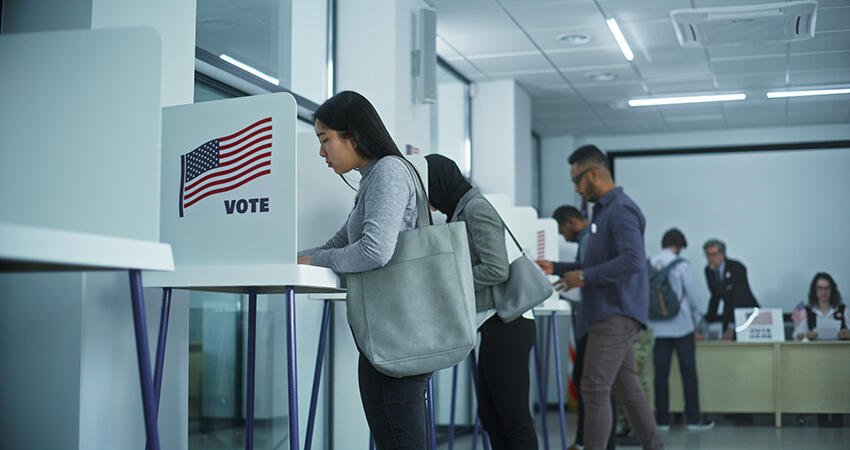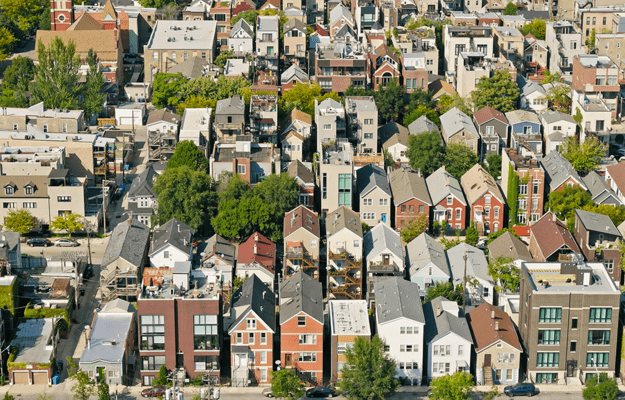
(Frame Stock Footage/Shutterstock)
Housing Instability Is a Critical Barrier to Voting Access
Voting is a fundamental civil right, and the United Nations considers it an essential element of democracy. Studies have highlighted how variations in access to the internet , home location, and accessibility of polling places create particular obstacles to voting for communities of color, people earning lower incomes, and people with disabilities (PDF). and accessibility of polling places create particular obstacles to voting for communities of color, people earning lower incomes, and people with disabilities (PDF).
One often overlooked barrier to voting access is housing instability and the experience of homelessness. With the rise of both phenomena, understanding how these barriers may link to voter participation is critical. Plus, this fall, housing issues are on the ballot in many states and cities. How can states ensure the Americans most affected by many of these housing policies have a say in their futures?
How does housing instability affect voting?
The housing affordability crisis is leading to a record number of people facing an uncertain housing situation. The Joint Center for Housing Studies’ latest State of the Nation’s Housing report found that in 2022, 12.1 million renting households were severely cost burdened. And other research shows that in 2023, more than 1 million evictions were filed and more than 650,000 people (PDF) experienced homelessness. Each of these households is living either with an unstable home address or without an address at all.
These housing challenges are exacerbated for communities of color because of historical and ongoing structural racism; more than half of Black (57 percent), Latinx (54 percent), and multiracial (50 percent) renter households were cost burdened compared with white (45 percent) households. The eviction crisis is most prevalent for Black households, and Black and Indigenous people are overrepresented (PDF) among people experiencing homelessness.
Evidence also shows a link between having a stable home address and voter participation, meaning the increase in housing instability influences voting. One study found that rental residential mobility depresses voter turnout. The author suggests moves may reduce voter turnout because of the need to register after moving. This appears to be particularly true when moves are because of eviction or foreclosure.
Another study analyzing voters during the 2016 election found that rental residential eviction rates negatively affected voter turnout. The effects were consistent in both rural and urban communities, and true in areas with high and low incomes.
One study focused on homeownership found that California neighborhoods affected by the foreclosure crisis experienced lower-than-expected voter turnout for the 2008 presidential election, even when controlling for neighborhood and individual characteristics. A similar study in Milwaukee, Wisconsin, found foreclosure was associated with a decline in voter turnout for both individuals and neighborhoods affected by foreclosure. Research has also found that people who are experiencing homelessness have lower registration rates and face barriers to voting.
This evidence suggests housing instability may create challenges for equal participation in the upcoming election, because eviction, foreclosure, and housing instability—which are associated with voting obstacles—are disproportionately concentrated in communities of color.
What barriers to voting exist for people experiencing housing instability?
People experiencing housing insecurity can vote using addresses from temporary shelters or a place where they receive mail. Yet, substantial barriers exist to people registering, updating their housing location, and providing proper identification.
Proof of address is often needed to register to vote. Although some states will accept utility bills, a driver’s license, or other proof of residence, in many states, a lack of address makes registering to vote and proving local residency more difficult. Most states also have a duration of residency requirement for voter registration, posing special challenges to those who frequently relocate or who have no sustained address.
Maintaining identification can be particularly challenging for people who may be experiencing homelessness or don’t have a stable home. There are many ways that identification can get lost, stolen, or taken away. For example, homeless encampment sweeps can result in the seizure and destruction of people’s personal property.
Procuring the correct identification can be challenging. Though a driver’s license is often accepted, other forms of ID, such as a passport, often need to be accompanied by other forms of residential proof, such as utility bills or a pay stub. Some states, such as Georgia and Mississippi, have instituted barriers that can be challenging for people experiencing housing insecurity, such as voter ID requirements.
How can localities facilitate equal access to voting?
Securing the ability to vote for people experiencing housing instability is key to ensuring all people have a voice in decisions that directly affect their lives. Voting is a powerful tool for representation, and when people engage in the political process, elected leaders can represent their interests.
Comprehensive efforts to reduce housing instability and homelessness would be the most effective way to end the negative effect of housing instability in voting. They could also reduce some of the racial inequities in housing instability. But, in their absence, policies that expand voter access and efforts to educate and register people could help mitigate the negative effects of housing instability and homelessness. Targeting outreach to communities that experience high rates of eviction, displacement, and housing instability may help amplify their impact.
Here are steps some states have taken to reduce these burdens.
- Increase outreach to people experiencing homelessness: People may not know they’re eligible to vote without a permanent address or that they can list a shelter as their address. Increasing awareness of their rights and providing information about registration and encouraging voter drives at shelters, food pantries, and clinics, among others, can help people know their rights. The National Alliance to End Homelessness and the National Low Income Housing Coalition have released tool kits (PDF) and resources to support housing organizations as they expand voter engagement.
- Expand eligible residences to be reported: Some states, including Arizona, Colorado, Iowa, Illinois, and Oregon, have laws that allow somebody experiencing homelessness to report various residences, including a homeless shelter, a courthouse, a general delivery address, or another place that they routinely return to. Arizona specifically notes that a person can’t be denied the vote because they don’t live in a permanent structure.
- Amend identification requirements to support people experiencing housing instability: Despite having strict voter ID laws, Indiana allows voter registration without identification with a claim of indigent status. Updating the requirements for identification by allowing alternative documents can make it easier for people to meet voter ID requirements and gain political representation.
- Ease pathways to replacing identification cards. When IDs are difficult to replace, the added burden of strict voter ID laws can disenfranchise many vulnerable people. States have the opportunity to create pathways for people to obtain state ID cards at a low cost or no cost for people experiencing homelessness.
- Same-day voter registration could reduce barriers for those who move frequently and find it difficult to keep their registration up to date. People who may not know their location from month to month shouldn’t become disenfranchised because of logistical challenges. Registering and voting on the same day alleviates the bureaucratic burden of needing to update your registration as you relocate.
The housing affordability crisis has made it increasingly difficult for Americans to maintain stable housing, and such instability has led to barriers that may affect the upcoming election. It’s crucial to ensure everyone can influence decisions that affect their lives. Adopting more-inclusive election policies can help remove obstacles and strengthen our democracy.


